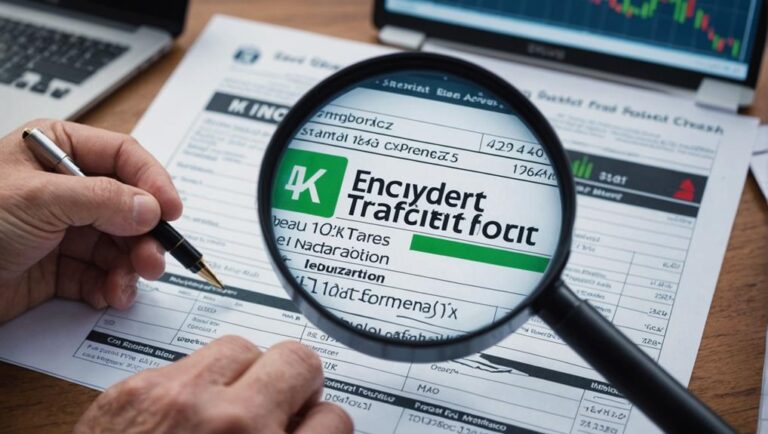Insider Trading Disclosure: How SEC Form 4 Safeguards Investor Interests

Understanding SEC Form 4 is crucial for safeguarding investor interests by ensuring prompt disclosure of insider transactions. Insiders are required to submit this form within two business days of buying or selling shares, providing essential details such as transaction type and share quantities. This swift disclosure promotes transparency, discourages insider trading, and upholds market integrity.
Adherence to Form 4 regulations builds trust and establishes a fair investment environment for all stakeholders. Analyzing these transactions can unveil valuable insights into the confidence and strategic choices of company executives, reinforcing investor trust.
Learn more about how these protocols bolster market confidence and protect investments.
Key Takeaways
SEC Form 4 necessitates insiders to promptly disclose transactions within two business days, ensuring timely transparency in the financial markets. This requirement upholds market integrity by providing accurate and immediate reporting, thereby preventing insider trading and manipulation. The timely disclosure of insider activities through Form 4 filings significantly enhances investor protection by revealing potential conflicts of interest and promoting fair trading practices.
Moreover, the transparency achieved through Form 4 filings plays a crucial role in boosting investor confidence and trust in the market. Investors rely on these disclosures to make informed decisions, knowing that insider transactions are being closely monitored and reported. This transparency not only benefits individual investors but also contributes to overall market efficiency and fairness.
Strict adherence to Form 4 reporting requirements fosters a culture of accountability among corporate insiders. By mandating detailed disclosures of ownership changes and transactions, Form 4 holds insiders accountable for their actions and helps prevent any misuse of privileged information. This accountability not only protects investors but also contributes to a more transparent and ethical corporate environment.
Understanding SEC Form 4
SEC Form 4 is a crucial document that insiders must submit to reveal any alterations in their ownership of company securities. It's a mandatory requirement for officers, directors, and shareholders holding over 10% of a company to comply with this regulation. The SEC instructs these insiders to file Form 4 within two business days of conducting a transaction. This swift disclosure maintains a high level of transparency, ensuring that all market participants have access to the most recent information regarding insider trading activities.
When insiders complete Form 4, they provide in-depth details about their beneficial ownership, such as the quantity of shares purchased or sold and the type of transaction. This level of disclosure is essential in protecting investor interests because it enables us to monitor insider actions and detect any potential conflicts of interest.
By utilizing this data, investors can make well-informed decisions, safeguarding their investments from any improper influence by individuals with privileged access to company information.
Understanding Form 4 is vital for anyone interested in overseeing insider activities. By monitoring these filings, we can enhance our comprehension of the dynamics within the companies we invest in, fostering a more transparent and secure investment environment.
Importance of Transparency
Transparency is crucial for maintaining trust in the financial markets and ensuring market integrity. Through the mandatory disclosure requirements of SEC Form 4, the Securities and Exchange Commission (SEC) enhances transparency by ensuring that insiders report any changes in their ownership of company stock. This transparency is vital for protecting the interests of investors and promoting fairness in securities trading.
Insiders are required to promptly report any acquisitions, dispositions, or other transactions involving company stock through Form 4. This immediate disclosure helps to prevent insider trading violations and provides investors with timely insights into insider activities. By monitoring Form 4 filings, investors can hold insiders accountable and oversee their actions, thereby strengthening oversight within the financial markets.
The transparency facilitated by SEC reporting obligations plays a significant role in upholding market integrity. When investors witness that insiders are held to stringent reporting standards, their confidence in the fairness of the market increases. This sense of assurance is essential for fostering a healthy and innovative market environment.
Reporting Requirements

When it comes to reporting requirements, it's crucial to emphasize the significance of adhering to the two-business-day filing deadline for Form 4. This requirement is essential for upholding market integrity by ensuring that all transactions, including stock gifts, are transparently disclosed in a timely manner, providing investors with the necessary information.
Filing Deadline Compliance
Insiders must file SEC Form 4 within two business days of any significant transaction involving company shares. This strict reporting deadline is crucial for compliance, ensuring that material transactions are promptly disclosed. By meeting these filing requirements, insiders play a key role in maintaining market transparency and enhancing investor protection.
Filing Form 4 promptly after a material transaction is essential to prevent potential market manipulation. Reporting changes in beneficial ownership swiftly within this narrow window is vital to safeguard investor interests. The SEC imposes these deadlines to detect and prevent any insider trading activities effectively, promoting a level playing field for all market participants.
Timely submission of Form 4 is a regulatory requirement that helps prevent market abuse and insider trading. Failure to adhere to these stringent deadlines can result in significant consequences, such as civil or criminal actions. The SEC's emphasis on prompt disclosure underscores its dedication to upholding a transparent and equitable market environment.
It's imperative to ensure that all insider trades are accurately reported and promptly disclosed, reinforcing the integrity of our financial markets.
Transaction Types Covered
It's crucial to have a clear understanding of the different types of transactions covered by SEC Form 4 to ensure accurate and timely reporting. SEC Form 4 mandates that insiders, such as officers, directors, and beneficial owners, report various transactions including purchases, sales, grants, exercises of stock options, and acquisitions through gifts.
Each transaction type comes with specific reporting requirements that must be meticulously followed to ensure compliance. Failure to report these transactions accurately can result in significant legal consequences for insiders. Therefore, it's imperative that each transaction type is disclosed accurately on Form 4 to enhance transparency in the market. This transparency helps protect the interests of investors by providing them with timely and reliable information about insider activities.
Comprehending and adhering to these reporting requirements not only helps in avoiding legal risks but also cultivates a culture of trust and accountability within the company. Accurate reporting of purchases, sales, grants, and other transactions ensures that investors have a clear insight into insider movements, fostering a more transparent and efficient market.
This transparency is vital for upholding investor confidence and promoting ongoing innovation within the financial sector.
Insider Details Disclosed
To deepen our understanding of transaction types, let's delve into the specific details insiders must disclose according to SEC Form 4 reporting requirements.
Insiders, individuals with access to confidential information about publicly traded companies, are obligated to submit Form 4 to the SEC within two business days following any significant transaction. This form plays a crucial role in upholding transparency and protecting the interests of investors by offering prompt and comprehensive insights into insider dealings.
Key information that insiders must disclose on Form 4 includes:
- Reporting Person: This entails revealing the identity and role of the insider involved in the transaction.
- Company: The name of the publicly traded company implicated in the transaction.
- Transaction Date: The exact date on which the substantial transaction took place.
- Security Type: The specific type of security (e.g., common stock, options) that was part of the transaction.
- Shares and Prices: Details on the quantity of shares exchanged and the price at which they were purchased or sold.
These details ensure that any alterations in ownership within the company are transparent and visible to all market participants. By enforcing timely filings with the SEC, these reporting requirements seek to mitigate any potential unfair advantages that insiders may possess, thereby promoting a more equitable market environment.
Non-compliance with these regulations can result in severe repercussions, including civil and criminal penalties, underscoring the critical importance of adhering diligently to these disclosure standards.
Regulatory Compliance
To comply with the updated SEC Form 4 reporting requirements, insiders now have a stricter timeline for reporting stock gifts. Effective as of April 1, 2023, insiders must disclose stock gifts on Form 4 within two business days. The reporting deadline is set at 10 p.m. Eastern Time on the second business day following the gift transaction. These changes are designed to promote transparency in insider activities and reduce compliance burdens, especially for estate planning transactions.
Insiders gifting stocks must strictly adhere to these new guidelines to avoid any potential breaches of insider trading regulations. Timely and accurate filings are crucial in upholding market integrity and trust.
Notably, gifts made under a compliant 10b5-1(c)(1) plan offer insiders a defense against allegations of insider trading, offering a layer of protection when executed correctly.
By prioritizing compliance with these regulations, we not only shield ourselves from regulatory sanctions but also reinforce investor trust in our practices. Embracing these requirements showcases our unwavering dedication to ethical conduct and financial transparency.
Let's remain vigilant and proactive in our approach to ensure that our actions consistently reflect the highest standards of accountability and openness.
Monitoring Insider Activity
We must monitor insider transactions reported through SEC Form 4 to ensure transparency and safeguard our investments.
Analyzing the trading patterns revealed in these filings provides valuable insights into the confidence and sentiment of company executives.
These reports enable us to identify potential insider trading violations, strengthening our confidence in the integrity of the market.
Reporting Insider Transactions
Tracking insider transactions through SEC Form 4 filings is crucial for investors to stay informed about significant changes in company ownership. By requiring insiders to disclose their transactions promptly, the SEC ensures transparency and builds confidence in the financial markets.
These filings are invaluable as they unveil important insider activity and potential market impact, enabling us to make well-informed decisions based on reliable data.
Form 4 filings cover a range of insider transactions, such as purchases and sales of company stock, grants of stock options, ownership changes from gifts or transfers, and conversions of derivative securities. These reports play a key role in monitoring insider sentiment and gauging insiders' confidence or concerns about their company's future.
With the SEC's stringent reporting requirements, we can effectively monitor and analyze these transactions to protect our investor interests.
Examining Form 4 data provides insights into the strategic decisions made by individuals with deep knowledge of the company's operations and prospects. Keeping abreast of insider transactions offers a clearer view of where company insiders are investing their confidence, helping us make more informed and strategic investment choices.
Analyzing Trading Patterns
Analyzing the trading patterns of company insiders provides valuable insights into their confidence and strategic decisions. Monitoring insider activity through SEC Form 4 filings offers a transparent view of insider buying and selling actions, allowing us to gauge the market's internal sentiment.
When insiders purchase shares, it often indicates their confidence in the company's future growth prospects, while insider selling could suggest otherwise. By examining the timing and volume of these trades, we can identify crucial market signals.
For instance, significant insider buying may imply that key executives anticipate a stock price increase. Conversely, a surge in insider selling could raise concerns about potential issues.
Keeping track of changes in insider ownership via these SEC filings is crucial. Sudden shifts can uncover emerging trends or irregularities in trading patterns. By diligently monitoring these patterns, we position ourselves to make well-informed decisions, leveraging the strategic moves of those with intimate company knowledge.
In essence, Form 4 filings serve not only as regulatory documents but also as powerful tools for understanding the market's underlying dynamics. By comprehending and analyzing these insider activities, we stay ahead of the curve, making data-driven investment choices.
Enhancing Investor Confidence
Disclosure of insider transactions on SEC Form 4 is crucial for boosting investor confidence. By requiring insiders to promptly report their trades, Form 4 ensures that investors are always informed about significant transactions within a company. This transparency is vital for protecting investor interests and upholding accountability in the securities industry.
Form 4 allows for the tracking of insider trading activities, helping to prevent potential misuse of nonpublic information. The SEC's focus on timely reporting enhances transparency, offering a clear insight into insider behavior. This transparency provides real-time visibility into insider trading activities, reducing the opportunity for improper use of confidential information and holding insiders accountable for their actions.
By promoting fairness and equity in the securities industry, Form 4 strengthens investor trust and confidence in the market. Overall, the systematic disclosure facilitated by Form 4 fosters a fair and transparent market environment. This transparency is essential for maintaining investor confidence and ensuring the integrity of the securities industry.
Frequently Asked Questions
What Is SEC Rule Form 4?
SEC Rule Form 4 details the process for reporting insider transactions, focusing on disclosure requirements and reporting obligations. Insiders are required to disclose their trades within specific deadlines to ensure compliance with SEC regulations. Any revisions to the form underscore the importance of insider accountability, with potential legal ramifications for failure to comply.
SEC Form 4 mandates the disclosure of changes in ownership of company stock by insiders. This rule aims to promote transparency and protect investors by providing timely information about insider transactions. Failure to adhere to Form 4 filing requirements can result in penalties and legal consequences for insiders who do not fulfill their reporting responsibilities.
When Must Form 4 a Be Filed With the Sec?
Picture a lighthouse guiding ships safely to shore. Filing Form 4-A with the SEC must occur within two business days to meet the deadline, ensuring prompt disclosure of ownership changes and transaction types. This promotes transparency in the market and compliance with insider trading regulations.
What Are the SEC Rules for Insider Trading?
To prevent market manipulation and ensure fair trading practices, it is crucial that we comply with SEC rules regarding insider trading. These rules prohibit corporate insiders from trading on any material nonpublic information, especially outside of designated trading windows. Additionally, there are strict regulations in place to prevent the sharing of insider information with others, known as the tipping prohibition. These measures are in place to safeguard the interests of shareholders and maintain the integrity of the financial markets.
One of the key requirements set by the SEC is the filing of Form 4, which is a mandatory disclosure of any changes in ownership of company stock by insiders. This form must be filed with the SEC within two business days of the transaction taking place. By requiring insiders to report their transactions promptly, the SEC aims to increase transparency and provide investors with important information that may impact their investment decisions.
Failure to comply with SEC rules regarding insider trading, including the filing of Form 4 when necessary, can result in severe legal penalties imposed by the SEC. These penalties serve as a deterrent to prevent individuals from engaging in illegal insider trading practices and help maintain a level playing field for all market participants. By adhering to these rules and regulations, we can contribute to a fair and transparent trading environment that benefits all investors.
What Does Code F Mean on SEC Form 4?
Code F on Form 4 signifies a gift of equity securities. When board members engage in this type of transaction, they are required to promptly report it within two days. This adherence to reporting deadlines ensures that transparency is maintained regarding changes in stock ownership. By disclosing such transactions, stakeholders can effectively monitor and track any shifts in ownership among company insiders. This practice promotes accountability and helps uphold the integrity of the financial markets.
Conclusion
SEC Form 4, a crucial regulatory requirement, serves as a safeguard for investor interests by ensuring transparency in insider trading activities. Surprisingly, approximately 80% of insider trading disclosures are promptly filed within just two days of the transaction taking place. This swift reporting not only promotes transparency but also provides investors with timely information regarding insider actions.
By adhering to regulatory guidelines and promptly reporting insider transactions through SEC Form 4, investors can effectively monitor and analyze insider activities. This diligence not only enhances investor confidence but also upholds the integrity and fairness of the financial markets. Ultimately, the stringent requirements imposed by SEC Form 4 contribute to a level playing field for all investors, fostering trust in the financial system.






